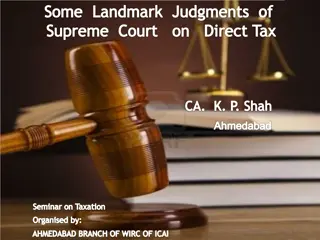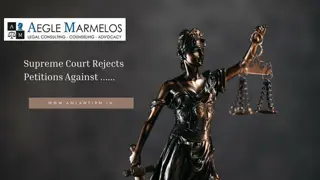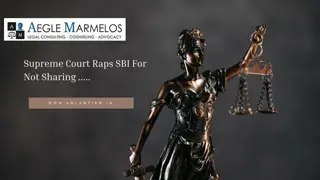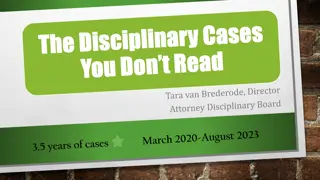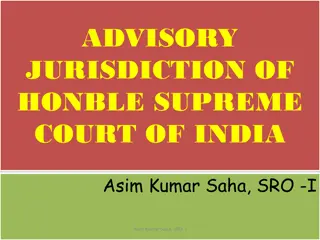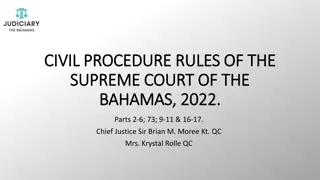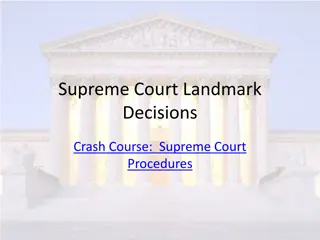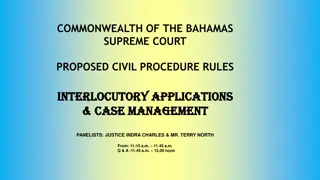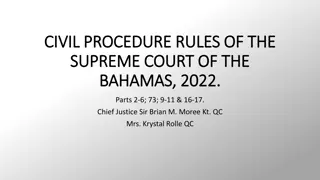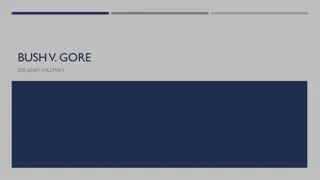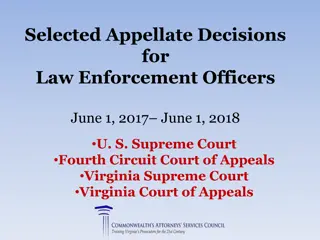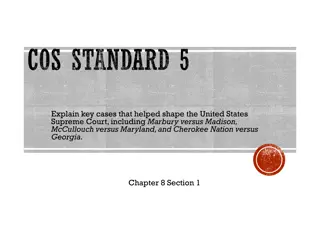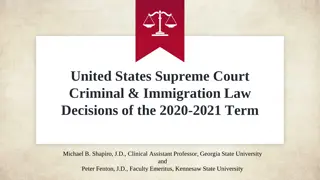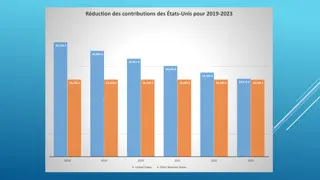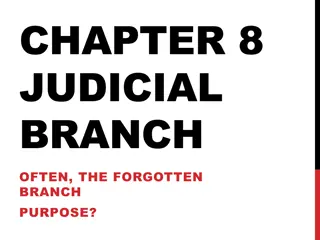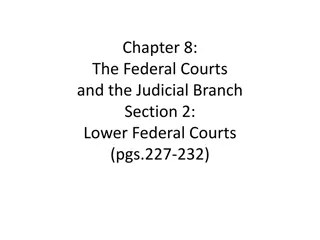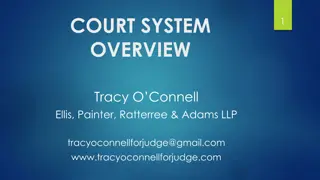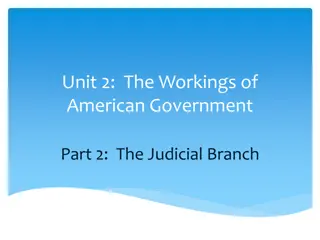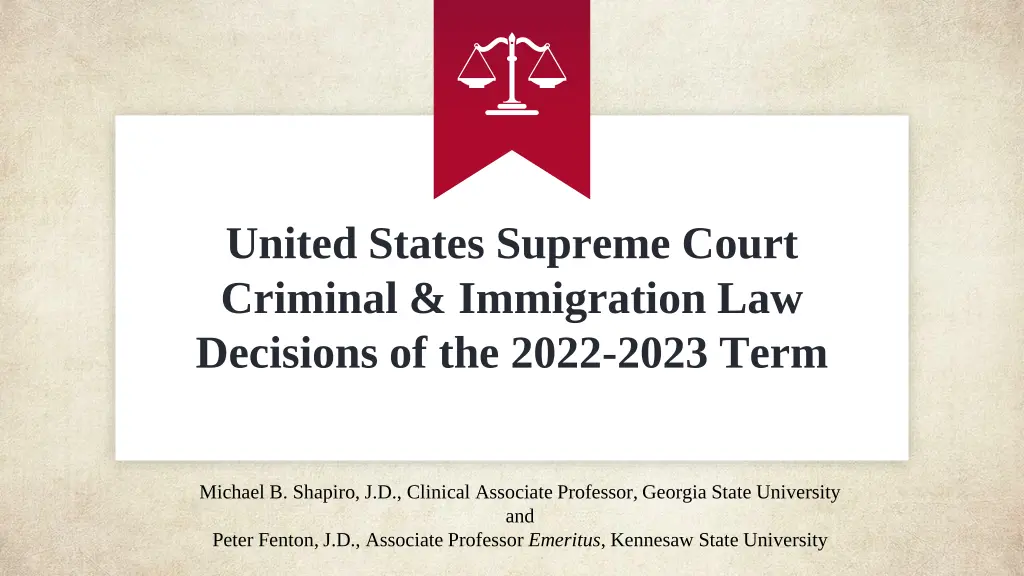
Supreme Court Criminal & Immigration Law Decisions 2022-2023 Term
Explore the significant Supreme Court decisions from the 2022-2023 term regarding criminal and immigration law. Delve into cases like Samia v. United States and Counterman v. Colorado to understand key legal interpretations and outcomes. Gain insights into Confrontation Clause rights and the First Amendment's role in addressing threats in the legal landscape.
Download Presentation

Please find below an Image/Link to download the presentation.
The content on the website is provided AS IS for your information and personal use only. It may not be sold, licensed, or shared on other websites without obtaining consent from the author. If you encounter any issues during the download, it is possible that the publisher has removed the file from their server.
You are allowed to download the files provided on this website for personal or commercial use, subject to the condition that they are used lawfully. All files are the property of their respective owners.
The content on the website is provided AS IS for your information and personal use only. It may not be sold, licensed, or shared on other websites without obtaining consent from the author.
E N D
Presentation Transcript
United States Supreme Court Criminal & Immigration Law Decisions of the 2022-2023 Term Michael B. Shapiro, J.D., Clinical Associate Professor, Georgia State University and Peter Fenton, J.D., Associate Professor Emeritus, Kennesaw State University
Flying Fickle Finger of Fate Award, Part 1 Confrontation Clause 3 Samia, aka Samic v. United States (Second Circuit Court of Appeals) No. 22-196, decided June 23, 2023 Thomas majority, Barrett concurring, Kagan dissenting, Jackson dissenting Samia, Hunter and Stillwell, were charged with the murder-for-hire of Lee. Prior to trial, the Government moved to admit Stillwell s postarrest confession where he claimed Samia had shot Lee. Since Stillwell would not be testifying and the full confession implicated Samia, the Government proposed the confession be introduced through the testimony of a DEA agent and eliminating Samia s name. The District Court granted the motion. At trial, the DEA agent testified that Stillwell had confessed to a time when the other person he was with pulled the trigger on that woman in a van that he and Mr. Stillwell was driving, and used the other person descriptor to refer to someone with whom Stillwell had traveled and lived and who carried a particular firearm. The District Court instructed the jury that the agent s testimony about Stillwell s confession was admissible only as to Stillwell. Samia was convicted on all counts. On appeal, the Second Circuit held admission of Stillwell s confession did not violate Samia s Confrontation Clause rights. Held: The Confrontation Clause was not violated by the admission of a nontestifying codefendant s confession that did not directly inculpate the defendant and was subject to a proper limiting instruction.
Flying Fickle Finger of Fate Award, Part 2 First Amendment, Awareness of Threats 4 Counterman v. Colorado (Colorado Court of Appeals) No. 22-138, decided June 27, 2023 Kagan majority, Sotomayor concurring, Thomas dissenting, Barrett dissenting Counterman sent hundreds of Facebook messages to C. W., whom he had never met. C. W. tried to block him, but he created new Facebook accounts. Several messages envisaged violent harm, causing C. W. to stop walking alone, decline social engagements, and cancel performances. Counterman was charged with [r]epeatedly . . . mak[ing] any form of communication with another person in a manner that would cause a reasonable person to suffer serious emotional distress and does cause that person . . . to suffer serious emotional distress. Colo. Rev. Stat. 18 3 602(1)(c). He moved to dismiss on First Amendment grounds, arguing that his messages were not true threats. The trial court rejected that argument under an objective standard, finding that a reasonable person would consider the messages threatening. On appeal Counterman argued that the State was required to show that he was aware of the threatening character. The Colorado Court of Appeals affirmed his conviction and the Colorado Supreme Court denied review. Held: The State must prove that the defendant had some subjective understanding of his statements threatening nature. A recklessness standard i.e., a showing that a person consciously disregard[ed] a substantial [and unjustifiable] risk that [his] conduct will cause harm to another, Voisine v. United States, 579 U. S. 686, 691(2016) is the appropriate mens rea.
Flying Fickle Finger of Fate Award, Part 3 Enhanced Sentencing for Acquitted Conduct 5 McClinton v. United States (Seventh Circuit Court of Appeals) No. 21-1557, decided June 30, 2023 Sotomayor dissenting denial of certiorari McClinton, while 17, shot and killed his friend in a dispute over the proceeds of a pharmacy robbery. The jury unanimously acquitted him of killing his friend and convicted him only of robbing the pharmacy. Nevertheless, at sentencing the prosecution argued he had killed his friend and the judge agreed, sentencing him to 19 years, including 13 years beyond the robbery sentence. Dissent: The argument for acquitted-conduct sentencing is generally based on standards of proof. A sentencing judge makes findings by a preponderance of the evidence, whereas a jury applies the higher beyond-a-reasonable-doubt standard. This creates concerns about procedural fairness and accuracy when the State gets a second bite at the apple with evidence that did not convince the jury coupled with a lower standard of proof. The Sentencing Commission, which is responsible for the Sentencing Guidelines, has announced that it will resolve questions around acquitted-conduct sentencing in the coming year. If the Commission does not act expeditiously or chooses not to act, however, this Court may need to take up the constitutional issues presented.
Failure to Give Jury Instruction Regarding Life Without Parole 6 Cruz v. Arizona (Arizona Supreme Court) No. 21-846, decided February 22, 2023 Sotomayor majority, Barrett dissenting Cruz was sentenced to death in 2005. Cruz argued that he was unable to inform the jury that if he were given a sentence of life in prison, he would be ineligible for parole. The Arizona Supreme Court held that Arizona Rule of Criminal Procedure 32.1(g) precluded post-conviction relief. Held: A defendant may bring a successive petition if there has been a significant change in the law that, if applicable to the defendant s case, would probably overturn the defendant s judgment or sentence. The Arizona Supreme Court s holding that Lynch v. Arizona, 578 U. S. 613 (2016) was not a significant change in the law is an exceptional case where a state-court judgment rests on such a novel and unforeseeable interpretation of a state-court procedural rule that the decision is not adequate to foreclose review of the federal claim.
Aggravated Identity Theft 7 Dubin v. United States (Fifth Circuit Court of Appeals) No. 22-10, decided June 8, 2023 Sotomayor unanimous, Gorsuch concurring Dubin was convicted of healthcare fraud under 18 U. S. C. 1347 after he overbilled Medicaid for psychological testing performed by the company he helped manage. The question is whether, in defrauding Medicaid, he also committed [a]ggravated identity theft under 1028A(a)(1). Section 1028A(a)(1) applies when a defendant, during and in relation to any [predicate offense, such as healthcare fraud], knowingly transfers, possesses, or uses, without lawful authority, a means of identification of another person. Bound by Fifth Circuit precedent, the District Court allowed Dubin s conviction for aggravated identity theft to stand, even though, in the District Court s view, the crux of the case was fraudulent billing, not identity theft. The Fifth Circuit, sitting en banc, affirmed. Held: Under 1028A(a)(1), a defendant uses another person s means of identification in relation to a predicate offense when the use is at the crux of what makes the conduct criminal.
Successive Petitions Under 28 U.S.C. 2255 8 Jones v. Hendrix, Warden (Eighth Circuit Court of Appeals) No. 21-857, decided June 23, 2023 Thomas majority, Sotomayor dissenting, Jackson dissenting Jones was sentenced after he conviction on two counts of unlawful possession of a firearm by a felon (18 U.S.C. 922(g)(1)and one count of making false statements to acquire a firearm. On a motion pursuant to 28 U. S. C. 2255 one of the unlawful possession sentences was vacated. Later in Rehaif v. United States, 588 U. S. ___, it was held that a defendant s knowledge of the status that disqualifies him from owning a firearm is an element of a 922(g) conviction. Jones sought to collaterally attack his remaining 922(g) conviction based on Rehaif by filing a petition for a writ of habeas corpus under 28 U. S. C. 2241 in the district of his imprisonment, the Eastern District of Arkansas. The District Court dismissed Jones habeas petition for lack of subject-matter jurisdiction, and the Eighth Circuit affirmed. Held: Section 2255(e) does not allow a prisoner asserting an intervening change in interpretation of a criminal statute to circumvent the Antiterrorism and Effective Death Penalty Act of 1996 s (AEDPA) restrictions on second or successive 2255 motions by filing a 2241 habeas petition.
Sentencing 9 Lora v. United States (Second Circuit Court of Appeals) No. 22-49, decided June 16, 2023 Jackson unanimous A federal court typically has discretion to run prison sentences concurrently or consecutively, with an exception in 924(c), which prohibits concurrent sentences for one who uses or carries a firearm during and in relation to any crime of violence or drug trafficking crime, or possesses a firearm in furtherance of any such crime. 924(c)(1)(A). Lora was convicted of the federal crime of aiding and abetting a violation of 924(j)(1), which penalizes a person who, in the course of a violation of subsection (c), causes the death of a person through the use of a firearm, where the killing is a murder, as well as a second federal crime, conspiring to distribute drugs. The District Court concluded that it lacked discretion to run the sentences concurrently, deeming 924(c)(1)(D)(ii) to be a bar on concurrent sentences for 924(j) violations. The Court of Appeals affirmed. Held: Section 924(c)(1)(D)(ii) s bar on concurrent sentences does not govern a sentence for a 924(j) conviction. A 924(j) sentence therefore can run either concurrently with or consecutively to another sentence.
Obstruction of Justice 10 Pugin v. Garland, Attorney General (Fourth Circuit Court of Appeals) No. 22-23, decided June 23, 2023 Kavanaugh majority, Jackson concurring, Sotomayor dissenting In two immigration proceedings, noncitizens Cordero-Garcia and Pugin were determined removable from the United States on the ground that they had convictions for aggravated felonies namely, offenses relating to obstruction of justice. See 8 U. S. C. 1101(a)(43)(S), 1227(a)(2)(A)(iii). On appeal, the Ninth Circuit concluded that Cordero-Garcia s state conviction for dissuading a witness from reporting a crime did not constitute an offense relating to obstruction of justice because the state offense did not require that an investigation or proceeding be pending. By contrast, the Fourth Circuit concluded that Pugin s state conviction for accessory after the fact constituted an offense relating to obstruction of justice even if the state offense did not require that an investigation or proceeding be pending. Held: An offense may relat[e] to obstruction of justice under 1101(a)(43)(S) even if the offense does not require that an investigation or proceeding be pending. Federal law provides that noncitizens convicted of a federal or state crime constituting an aggravated felony are removable from the United States.
Procedural Due Process Statute of Limitations 11 Reed v. Goertz (Fifth Circuit Court of Appeals) No. 21-422, decided April 19, 2023 Kavanaugh majority, Thomas dissenting, Alito dissenting Reed was convicted of murder in 1998 and sentenced to death based on DNA evidence. In 2014, he filed an appeal in Texas state court for DNA testing, however this and successive appeals were denied. Reed then filed a lawsuit in federal court claiming that the Texas courts had violated his constitutional rights. The district court dismissed Reed's lawsuit. On appeal, the Fifth Circuit affirmed the lower court's decision. There was a conflict between the Fifth and Seventh Circuits, holding that the statute of limitations on 1983 claims begins to run at the moment the state trial court denies DNA testing, and the Eleventh Circuit, holding that the claim begins to run at the end of state court litigation denying DNA testing, including any appeals. Held: When a prisoner pursues state post-conviction DNA testing through the state-provided litigation process, the statute of limitations for a 1983 procedural due process claim begins to run when the state litigation ends, in this case when the Texas Court of Criminal Appeals denied Reed s motion for rehearing.
Improper Venue and Retrial 12 Smith v. United States (Eleventh Circuit Court of Appeals) No. 21-1576, decided June 15, 2023 Alito unanimous Smith was indicted in the Northern District of Florida for theft of trade secrets but moved to dismiss the indictment for lack of venue, citing the Constitution s Venue Clause, Art. III, 2, cl. 3, and its Vicinage Clause, Amdt. 6. The District Court concluded that factual disputes related to venue should be resolved by the jury and denied Smith s motion to dismiss without prejudice. The jury found Smith guilty, and Smith moved for a judgment of acquittal based on improper venue. See Fed. Rule Crim. Proc. 29. The District Court denied the motion, reasoning that the effects of Smith s crime were felt at StrikeLines headquarters, located in the Northern District of Florida. On appeal, the Eleventh Circuit determined that venue was improper, but disagreed with Smith that a trial in an improper venue barred reprosecution. The Eleventh Circuit therefore vacated Smith s conviction for theft of trade secrets. Held: The Constitution permits the retrial of a defendant following a trial in an improper venue conducted before a jury drawn from the wrong district.
First Amendment 13 United States v. Hansen (Ninth Circuit Court of Appeals) No. 22-179, decided June 23, 2023 Barrett majority, Thomas concurring, Jackson dissenting Hansen promised hundreds of noncitizens a path to U. S. citizenship through adult adoption. But that was a scam. Though there is no path to citizenship through adult adoption, Hansen earned nearly $2 million from his scheme. The United States charged Hansen with, inter alia, violating 8 U. S. C. 1324(a)(1)(A)(iv), which forbids encourag[ing] or induc[ing] an alien to come to, enter, or reside in the United States, knowing or in reckless disregard of the fact that such [activity] is or will be in violation of law. Hansen was convicted and moved to dismiss the clause (iv) charges on First Amendment overbreadth grounds. The District Court rejected Hansen s argument, but the Ninth Circuit concluded that clause (iv) was unconstitutionally overbroad. Held: Because 1324(a)(1)(A)(iv) forbids only the purposeful solicitation and facilitation of specific acts known to violate federal law, the clause is not unconstitutionally overbroad.
Standing 14 United States v. Texas (Fifth Circuit Court of Appeals) No. 22-58, decided June 23, 2023 Kavanaugh majority, Gorsuch concurring, Barrett concurring, Alito dissenting Homeland Security prioritized the arrest and removal from the United States of noncitizens who are suspected terrorists or dangerous criminals or who have unlawfully entered the country only recently. Texas and Louisiana claimed the Guidelines contravened federal statutes and sued. The District Court found the States would incur costs and that the States had standing to sue based on those costs. The Fifth Circuit declined to stay the District Court s judgment Held: Texas and Louisiana lack Article III standing to challenge the Guidelines.
Cases to Watch in the 2023-2024 Term 15 Brown v. United States (Third Circuit Court of Appeals) [note that Jackson v. United States has been consolidated with this case] Brown was indicted in York County, Pennsylvania, for multiple counts, including being a felon in possession of a firearm, in violation of 18 U.S.C. 922(g). Brown pleaded guilty to one charge of drug possession and distribution as well as the 922(g) offense. The U.S. District Court for the Middle District of Pennsylvania sentenced him to concurrent terms of 180 months imprisonment due to prior convictions triggering the fifteen-year mandatory minimum sentence prescribed in the Armed Career Criminal Act (ACCA). Brown appealed his enhanced sentence, arguing that his prior state marijuana convictions should not serve as predicates under the ACCA because those crimes are no longer a categorical match to their federal counterpart. The U.S. Court of Appeals for the Third Circuit affirmed. Question presented: Whether the "serious drug offense" definition in the Armed Career Criminal Act incorporates the federal drug schedules that were in effect at the time of the federal firearm offense or the federal drug schedules that were in effect at the time of the prior state drug offense.
Cases to Watch in the 2023-2024 Term 16 Culley v. Marshall (Eleventh Circuit Court of Appeals) Culley s son was pulled over by police while driving a car registered to his mother. Police arrested him, charged him with possession of marijuana and drug paraphernalia, and seized the vehicle. Culley unsuccessfully tried to retrieve the vehicle, and subsequently the State of Alabama filed a civil asset forfeiture action in state court. After 20 months, the state court granted Culley summary judgment, finding that she was entitled to the return of her vehicle under Alabama s innocent-owner defense. Culley filed a class-action lawsuit in federal court claiming under 42 U.S.C. 1983 that the failure of the state and local officials to provide a prompt post-deprivation hearing violated their rights under the Eighth and Fourteenth Amendments. The district court ruled for the defendants, and the U.S. Court of Appeals for the Eleventh Circuit affirmed as to those claims that were not moot. Question presented: What test must a district court apply when determining whether and when a post- deprivation hearing is required under the Due Process Clause?
Cases to Watch in the 2023-2024 Term 17 Pulsifer v. United States (Eighth Circuit Court of Appeals) Pulsifer pleaded guilty to distributing at least fifty grams of methamphetamine but asked the district court for a sentence lower than the statutory minimum under 18 U.S.C. 3553(f) which allows a sentence lower than the statutory minimum upon finding that the defendant does not have: more than 4 criminal history points; a prior 3-point offense; and a prior 2-point violent offense. Pulsifer met the first two criteria, having more than four criminal history points and a prior three-point offense. The district court concluded that this history alone made him ineligible for sentencing under 3553(f), notwithstanding that he did not also have a prior two-point violent offense and denied his request. The Eighth Circuit affirmed, concluding the statutory word and means a defendant must not have any of the criteria, not that he must not have all of them. Question presented: Must a defendant show he does not meet any of the criteria listed in 18 U.S.C. 3553(f) to qualify for a sentence lower than the statutory minimum?
Cases to Watch in the 2023-2024 Term 18 United States v. Rahimi (Fifth Circuit Court of Appeals) Rahimi was subject to a protective order after allegedly assaulting his ex-girlfriend. Subsequently, he was involved in five shootings. He was prosecuted for violating the federal gun restriction on domestic violence offenders. The District Court rejected his claim that the case should be dismissed on Second Amendment grounds. Thereafter, the Supreme Court ruled in New York State Rifle & Pistol Association v. Bruen, 597 U.S. ___ (2022), requiring that modern gun violence prevention laws comport with historical laws. The Fifth Circuit struck down the federal law prohibiting possession of firearms by people subject to domestic violence protection orders, ruling the prohibition unconstitutional under the Second Amendment and Bruen. Question presented: Whether 18 U.S.C. 922(g)(8), a specific statute that prohibits the possession of firearms by someone subject to a domestic violence restraining order is constitutional under the Second Amendment in light of Bruen.
A Nod to Michael Reece 19 Haaland, Secretary of the Interior, et al. v. Brackeen et al. (Fifth Circuit Court of Appeals) No. 21-376, decided June 15, 2023 Barrett majority, Gorsuch concurring, Kavanaugh concurring, Thomas dissenting, Alito dissenting The Indian Child Welfar Act (ICWA) aims to keep Indian children connected to Indian families, governing state court adoptions involving Indian children requiring placement of an Indian child according to a hierarchical preferences, unless the state court finds good cause to depart from them. Indian families or institutions from any tribe outrank unrelated non-Indians or institutions. Petitioners-a birth mother, foster and adoptive parents, and the State of Texas-filed this suit challenging the ICWA as unconstitutional on multiple grounds including that Congress lacks authority to enact ICWA. The District Court granted petitioners motion for summary judgment on their constitutional claims, and the en banc Fifth Circuit affirmed in part and reversed in part, concluding that the ICWA does not exceed Congress s legislative power or violate the nondelegation doctrine, but finding that ICWA s other preferences prioritizing Indian families over non- Indian families were unconstitutional discrimination. Held: The Indian Child Welfare Act s restrictions on placement of Native American children do not violate anti-commandeering principles of the Tenth Amendment.
Thanks! Any questions? You can find us at mshapiro5@gsu.edu & pfenton@kennesaw.edu 20


